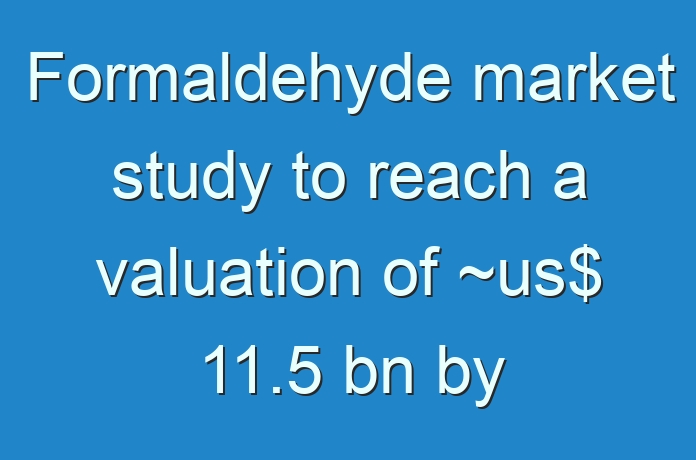
Formaldehyde Market: Introduction
The global formaldehyde market was valued at ~US$ 8.6 Bn in 2018 and is anticipated to expand at a CAGR of ~3% from 2019 to 2027. Use of formaldehyde in the production of resins is growing; these formaldehyde based resins find applications in a wide range of activities.
Key Drivers of Formaldehyde Market
Formaldehyde-based resins, such as urea formaldehyde resins, are excellent adhesives that play an integral role in the construction sector. They are used in furniture applications in the production of particle boards and wood panels. Formaldehyde-based resins help bind wood chips and sawdust to create engineered wood products, which are durable, cost-effective, and high performance alternatives to solid wood. Therefore, increasing demand from construction and furniture sectors is expected to boost the demand for formaldehyde. Formaldehyde is also used as an intermediate to produce other chemicals, such as butanediol, which is further employed to produce tetrahydrofuran. Tetrahydrofuran is used as a solvent for vinyl resins. Rising use of formaldehyde as a chemical intermediate is expected to further boost the demand during the forecast period.
Increasing Demand from End-use Industries to Offer Attractive Opportunities
Rise in urbanization, increase in population, and positive developments in regional economic conditions are projected to drive the demand for houses in the near future. This is expected to boost the demand for wood-based panels. These factors are anticipated to augment the demand for formaldehyde, as formaldehyde-based resins are used to produce wood-based panels. Moreover, rising demand for formaldehyde in automotive, chemical, and personal care & cosmetic sectors due to its excellent adhesive and binding properties is projected to drive the market during the forecast period.
Request a Sample –
https://www.transparencymarketresearch.com/sample/sample.php?flag=S&rep_id=1367
Stringent Regulatory Norms to Hamper Market
Various countries across the globe have imposed stringent regulatory norms to check formaldehyde emissions from a vast range of products. Formaldehyde is produced on a large scale across the globe; however, concerns over the adverse effects of the product on human health has prompted regulatory bodies to impose restrictions on its usage. Furthermore, fluctuation in raw material pricing, mainly methanol, is anticipated to impact the market. The market is vulnerable to changes in methanol production. Methanol is produced from synthesis gas (carbon monoxide and hydrogen), which is derived from oil, coal, or biomass. This in turn is expected to hamper the growth of the market in the coming years.
Asia Pacific Dominates the Formaldehyde Market
Asia Pacific is expected to be a highly attractive region of the market during the forecast period. With its rapidly growing population, Asia Pacific is expected to contribute significantly to the global building & construction industry, in terms of value sales growth, thereby propelling the formaldehyde market. Formaldehyde is used in construction of wood-based panels and in manufacturing of furniture. Europe and North America cumulatively held a market share of ~34% of the market in 2018. The two regions are expected to lose market share by 0.4% and 0.2%, respectively, by the end of the forecast period. The decline in the market share can be attributed to increase in the number of regulations on usage of formaldehyde in these regions.
Use of Formaldehyde to Produce Resins to Drive Market
The resin segment held a major share of the formaldehyde market in 2018. Formaldehyde-based resins are employed in the textile industry to help bind dyes and pigments to fabrics. Formaldehyde is used in the production of UF and PF resins. These resins are widely used in furniture and construction sectors, due to their adhesive strength and moisture resistance.
Request for covid19 impact analysis –
https://www.transparencymarketresearch.com/sample/sample.php?flag=covid19&rep_id=1367
Prominent Companies in Global Market
Prominent players operating in the formaldehyde market are BASF SE, Hexion Inc., PJSC Metafrax, and Ercros S.A. In May 2017, Hexion Inc. launched a new product called EcoBind ONE, a formaldehyde scavenger product, to free formaldehyde and eliminate the emission of formaldehyde during the manufacture of panel boards. Ercros S.A’s production capacity for formaldehyde and paraformaldehyde is 700-kilo tons and 115 kilotons, respectively. BASF SE’s production capacity for formaldehyde is 750-kilo tons per annum.
Buy now-
https://www.transparencymarketresearch.com/checkout.php?rep_id=1367<ype=S
Global Formaldehyde Market: Segmentation
Formaldehyde Market, by Derivative
- Urea-formaldehyde Resin
- Phenol Formaldehyde Resin
- Polyoxymethylene
- Melamine Formaldehyde Resin
- Pentaerythritol
- Methylene Diphenyl Diisocyanate
- Butanediol
- Hexamethylenetetramine
- Others (including Trimethylol Propane and Neopentyl Glycol)
Formaldehyde Market, by Application
- Resins
- Fibers
- Solvents
- Plasticizers
- Drying Agents
- Other Chemical Intermediates (including Amino and Phenolic Resins)
Formaldehyde Market, by End Use
- Chemicals
- Agriculture
- Building & Construction
- Personal Care & Cosmetics
- Healthcare
- Automotive
- Others (including Photography)
Formaldehyde Market, by Region
- North America
- S.
- Canada
- Europe
- Germany
- France
- K.
- Italy
- Spain
- Russia & CIS
- Rest of Europe
- Asia Pacific
- China
- Japan
- India
- South Korea
- ASEAN
- Rest of Asia Pacific
- Latin America
- Brazil
- Mexico
- Rest of Latin America
- Middle East & Africa
- GCC Countries
- South Africa
- Rest of Middle East & Africa
The Formaldehyde market has been undergoing some remarkable growth dynamics, shaped increasingly by digital technologies and environmental sustainability concerns of product development. Over the decades, the feedstock variability and the onslaught of cheaper substitutes have squeezed in profit margins of the chemical and materials sector. On the other hand, the value chain of several businesses in the Formaldehyde market has undergone overhaul, increasingly rendering some aspiring players with greater control over the forces and demand. The penetration of Industry 4.0 in in the market has stirred game-changing trends for range of stakeholders in the overall chemicals and materials sector. Manufacturing and production environments of businesses in the Formaldehyde market are keen on formulating and implementing strategic frameworks that will turn them into digital enterprises.
More Trending Report-





